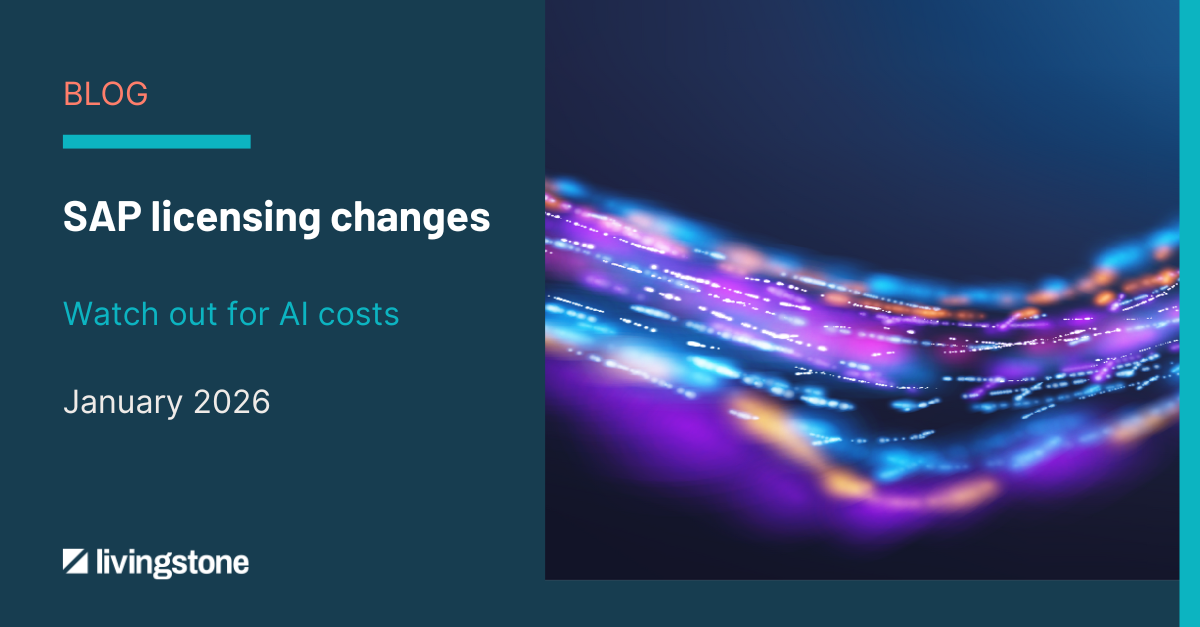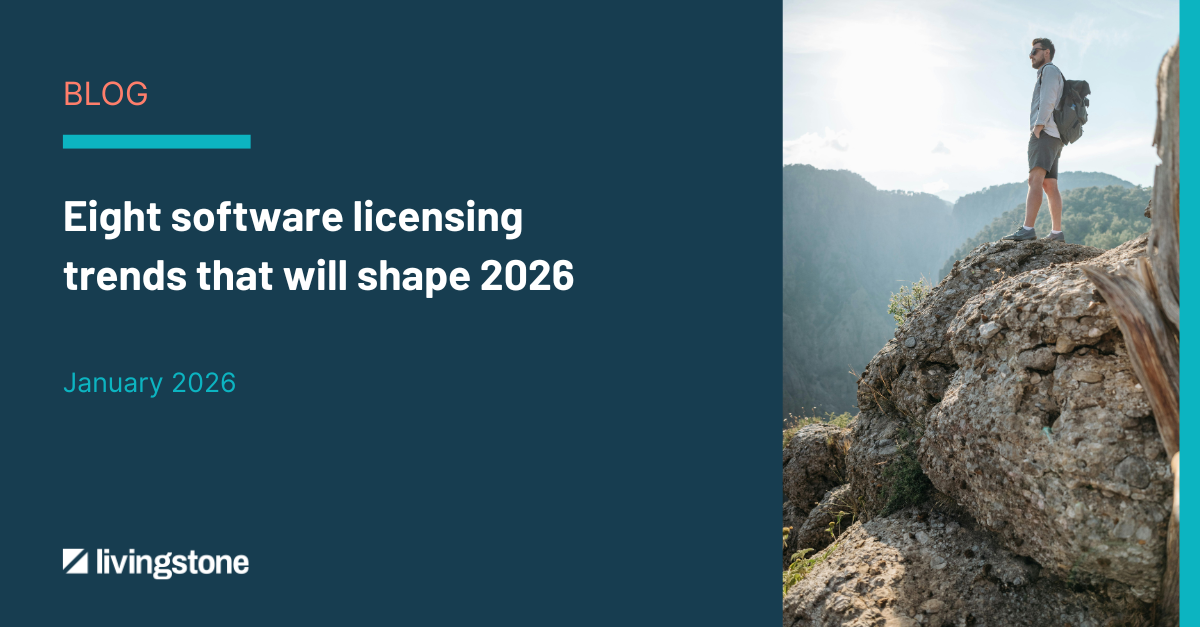As publisher events season kicks off, there is one over riding theme across all the events: AI.
As exciting as the AI push from major vendors like Microsoft, Oracle, IBM, Salesforce, ServiceNow and SAP is, AI at an enterprise level continues to require enormous amounts of processing time and resources. As it is integrated into more and more products, the running costs will undoubtedly be passed on.
In this blog we look at what is changing and provide a handy AI software deal evaluation checklist.
AI is top of all event agendas
To give you a sense of how dominant the topic of AI is among the large software vendors, here are just a few of the upcoming events, all sporting a common theme:
Oracle
-
Oracle CloudWorld Tour – New York City
May 6, 2025 | Hilton Midtown
A one-day event focusing on cloud, data, and AI innovations. -
Oracle DatabaseWorld: Multicloud AI Edition
May 7, 2025 | Convene, 360 Madison Avenue, NYC
Explore Oracle’s AI and multicloud innovations with hands-on workshops and networking opportunities.
Microsoft
-
Microsoft 365 Community Conference
May 6–8, 2025 | Las Vegas
A premier event for Microsoft 365 users, focusing on collaboration tools and AI integration. -
Microsoft Build 2025
May 19–22, 2025 | Seattle
An annual developer conference highlighting the latest in Microsoft technologies, including Azure and AI advancements.
IBM
-
IBM Think 2025
May 5–8, 2025 | Boston
Join over 5,000 business and technology leaders to explore AI, automation, and hybrid cloud strategies.
SAP
-
SAP Sapphire & ASUG Annual Conference
May 19–21, 2025 | Orlando, Florida
SAP's premier event showcasing innovations in enterprise applications and business AI.
Salesforce
-
Agentforce World Tour NYC
May 21, 2025 | Javits Center, New York
Experience 180+ sessions on AI-driven agents and personalized customer experiences.
ServiceNow
-
Knowledge 2025
May 6–8, 2025 | Las Vegas
ServiceNow's flagship event focusing on AI in workflow automation and digital transformation.
By the end of May, the industry can expect a slew of new AI-related tools, technologies, offers and pricing. So what does that mean for SAM and procurement teams?
Licensing: New costs, New Models
-
AI add-ons are becoming the norm: Microsoft Copilot, Salesforce Einstein, and SAP Joule are being sold as premium features rather than included capabilities. That means new SKUs, bundled packages, and often per-user or per-transaction pricing models.
- Shift toward consumption-based pricing: AI capabilities are increasingly priced by usage (e.g. number of API calls), making licensing far less predictable: it can be challenging to understand how your users will take advantage of new functionality such as AI.
-
Bundling and obfuscation: Vendors may use AI buzz to repackage offerings, making it harder to isolate value and negotiate effectively.
The takeaway: SAM and procurement teams need to carefully assess ROI, avoid double-dipping on existing functionality, and challenge ambiguous bundling.
Software Asset Management: More Complexity, More Risk
- License sprawl from AI tools: Expect more niche tools and trial licenses to pop up as departments experiment with AI solutions—direct, resulting in software offers to end users may bypass procurement
-
Audits will get sneakier: Vendors may use AI adoption as a trigger for audits or soft audits, especially where integrations with core platforms occur.
-
New data, new rules: AI models often process sensitive data, raising questions about data residency, usage rights, and license compliance tied to data governance.
- An ever-changing tool: AI models are constantly being updated and refined. The AI functionality you purchase in Year 1 may be radically different by Year 3.
The takeaway: SAM needs to evolve to track not just software installs, but how AI capabilities are being used and whether they comply with contractual terms.
Procurement: Strategic Partnerships, Not Just Price Battles
-
Vendor lock-in gets deeper: AI features often only work fully when integrated with a vendor’s broader ecosystem (e.g. Microsoft Copilot requires M365 E5). This reduces flexibility and increases long-term TCO.
-
More stakeholder involvement: Procurement will need to collaborate closely with IT, Legal, and Risk to evaluate AI offerings from a value, ethics, and compliance perspective.
-
Opportunity for leverage: As vendors push AI adoption, procurement can use this as a bargaining chip in renewals and expansions—if they’re prepared.
The takeaway: Now’s the time to challenge vendors on transparency, roadmap clarity, and true value—not just features.
AI Software Deal Evaluation Checklist
If your executives return from these industry events, keen to implement new AI technologies, this checklist will help SAM and procurement leaders to navigate the wave of AI-laden licensing offers that will be coming their way.
1. Licensing & Cost Transparency
-
Are AI features clearly separated in the pricing model?
-
Is it a standalone license, an add-on, or bundled into an existing SKU?
-
Is the pricing fixed (per user) or usage-based (per API call, token, etc.)?
-
Have future cost escalations or usage thresholds been disclosed?
-
Is there flexibility to remove AI features at renewal?
2. ROI & Usage Justification
-
Is there a business case for the AI feature (productivity, cost-saving, etc.)?
-
Have potential overlaps with existing tools been identified?
-
Can the vendor provide proof points, case studies, or a POC?
-
Are metrics in place to track value and usage post-deployment?
3. Compliance & Risk
- Does the AI use company or customer data, and if so, is that use compliant with your regulatory and or/ data governance requirements?
-
Are there clear data privacy, sovereignty, and security policies?
-
Have you reviewed the vendor’s terms around AI model usage, training, and IP?
-
Are audit clauses tied to AI usage explicitly defined?
4. Integration & Dependencies
-
Do the AI features require integration with other licensed tools (e.g. M365 E5, ServiceNow Pro+)?
-
Is there potential for vendor lock-in due to AI capabilities?
-
Are additional support or consulting services needed to deploy AI features?
- Do the AI features require integration with other licensed tools or have different functionality based on your current product or subscription (e.g. M365 E3/E5, ServiceNow Pro Plus/Enterprise Plus)?
5. Commercial Negotiation Levers
-
Can AI licensing be tied to larger contract renewals or expansions for leverage?
-
Have unused or underutilized licenses been used as a trade-off?
-
Is there scope for co-innovation, joint pilots, or preferred customer discounts?
Getting support
AI offers enormous potential (and risk), but may not be right for every organisation, or every product.
For procurement and SAM teams, it's important to understand the licensing, contract, compliance and negotiation implications. If you want to talk to the Livingstone team about how to manage new or existing contacts that are being impacted by AI, contact us.




